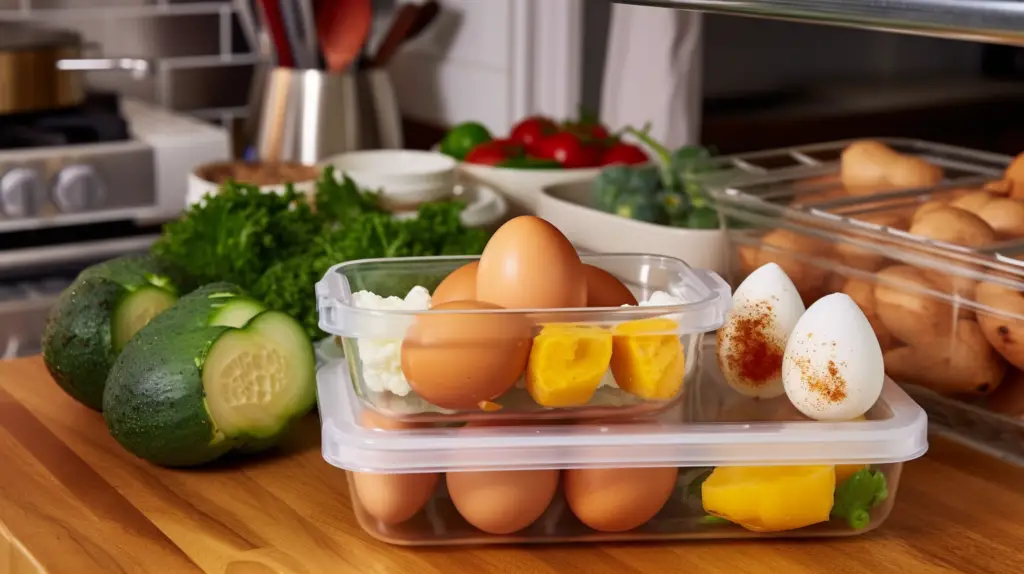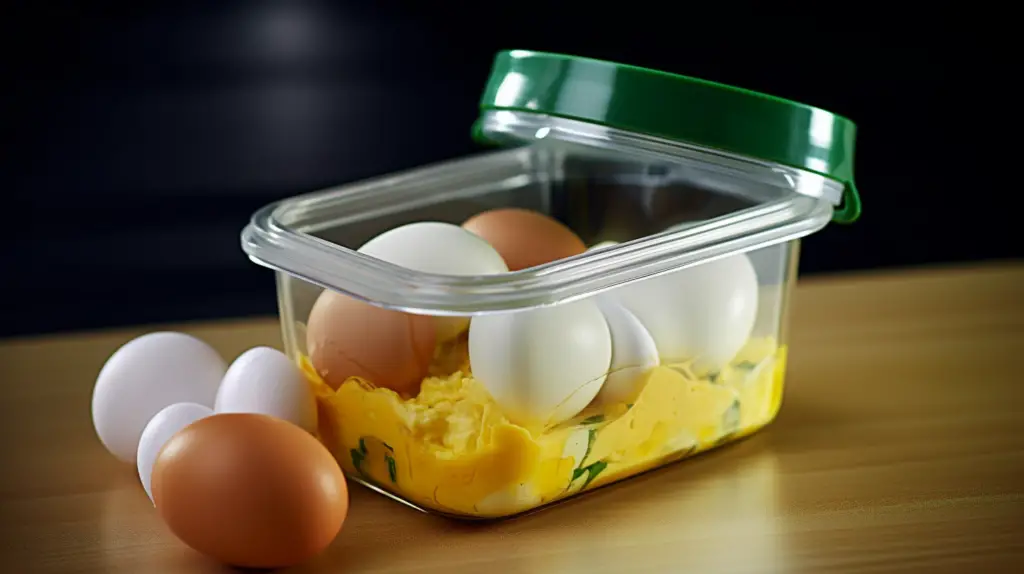Egg salad is a popular lunchtime staple that has been enjoyed by people for generations. It is an easy-to-make dish that combines boiled eggs, mayonnaise, and various seasonings to create a creamy and flavorful spread.
However, like all perishable food items, egg salad has a limited shelf life. The question of how long egg salad lasts in the fridge is one that many people wonder about.
To answer this question, it is important to understand the basics of the shelf life of egg salad. Proper storage techniques can also play a significant role in extending its freshness and preventing spoilage.
In this article, we will explore these topics in detail and provide useful tips for ensuring your egg salad stays fresh for as long as possible.
Key Takeaways
- Egg salad has a shelf life of no more than three days in the fridge due to the risk of bacterial growth, and it should be stored in an airtight container at a temperature between 32°F to 40°F.
- Proper storage techniques such as using airtight containers, storing in colder areas of the refrigerator, and adding vinegar or lemon juice can help extend the shelf life of egg salad.
- Signs of spoilage include visible mold or discoloration, clumps or lumps in the mixture, and a sour or rancid odor.
- Repurposing leftover egg salad by incorporating it into recipes such as potato or pasta salads, using it as a sandwich spread or topping for an omelet, or adding it to deviled eggs can help reduce waste while also elevating meal flavors.
Shelf Life of Egg Salad: Understanding the Basics

The shelf life of egg salad is a crucial aspect to consider, as it can affect the safety and overall quality of the food. Egg salad is a popular dish made from boiled eggs mixed with mayonnaise and other ingredients such as celery, onions or herbs. The ingredients used in making egg salad are highly perishable and can quickly spoil if not stored correctly. Therefore, understanding the shelf life of egg salad is essential for maintaining its freshness and nutritional value.
Food safety is one of the primary concerns when it comes to determining the shelf life of egg salad. Since egg is a protein-rich food that supports bacterial growth, it becomes susceptible to contamination if left unrefrigerated for an extended period. The presence of mayonnaise in egg salad further increases its risk of bacterial growth due to its high-fat content, which provides an ideal environment for bacteria to thrive. Hence, consuming spoiled egg salad can result in food poisoning or other illnesses.
Apart from food safety concerns, monitoring the nutrition content of egg salad also plays a vital role in determining its shelf life. As time passes by, the nutritional value of any food decreases gradually due to natural oxidation processes or chemical reactions that occur within it. Therefore, consuming stale or old egg salads will not only compromise their taste but also reduce their nutrient content.
Understanding how long egg salad lasts in your fridge helps ensure both food safety and nutrition preservation. Proper storage techniques such as refrigerating at temperatures below 40°F and avoiding storing for more than three days can help prolong its shelf life while maintaining its flavor profile and nutritional value before consumption.
Proper Storage Techniques for Egg Salad

Properly storing egg salad involves placing it in an airtight container and keeping it at a consistent temperature to maintain its freshness. Storage containers should be made of glass or plastic and have tight-fitting lids to prevent air from entering the container. This will help prevent bacterial growth, which can cause the egg salad to spoil quickly. The storage containers must also be clean before use.
Ingredient variations play a crucial role in determining how long egg salad will last in the fridge. For example, adding mayonnaise or other dairy products into the mix can reduce its shelf life significantly. These ingredients contain moisture, which can promote bacterial growth if not kept at optimal conditions. To extend the lifespan of egg salad, consider using vinegar or lemon juice as a substitute for mayonnaise.
Another factor that affects egg salad’s shelf life is temperature. It is essential to keep it refrigerated at all times and avoid leaving it out on hot surfaces for extended periods. When storing leftover egg salad, place it in the refrigerator within two hours after preparation to ensure maximum freshness. If you plan to consume your egg salad after three or four days, consider freezing it instead.
Proper storage techniques are vital when storing egg salads in the fridge. By following recommended guidelines such as using appropriate storage containers, ingredient variations and maintaining consistent temperatures, you can increase their shelf life while ensuring their safety for consumption later on. In our subsequent section about signs of spoilage: how to identify bad egg salad,’ we will discuss how these factors come into play when identifying whether your stored egg salads are still safe for eating or not without any guesswork involved.
Signs of Spoilage: How to Identify Bad Egg Salad
Identifying bad egg salad is crucial to prevent foodborne illnesses, and it can be done by observing its appearance, texture, and odor. The first thing to look out for is any visible mold or discoloration on the surface of the egg salad. If the color appears dull or yellowish, it could be a sign of spoilage as fresh egg salad should have a vibrant yellow color. Additionally, if there are any bubbles or liquid pooling around the edges of the container, this indicates that bacteria may have started to grow.
Another way to tell if egg salad has gone bad is by checking its texture. Fresh egg salad should be creamy and smooth in consistency. However, if you notice any clumps or lumps in the mixture, this suggests that it has started to dry out and spoil. Similarly, if the dressing appears watery instead of being thick and creamy, it may indicate that moisture has seeped into the container.
You can use your sense of smell to detect whether your egg salad is still safe for consumption. A sour or rancid odor emanating from the dish suggests bacterial growth and means that it’s time to discard it immediately. On the other hand, fresh egg salad should have a mild aroma with notes of mustard and vinegar.
Common mistakes such as leaving eggs at room temperature for too long before making them into a salad or not refrigerating leftovers promptly can lead to spoilage quickly. Therefore, always ensure proper storage techniques such as storing in an airtight container in your refrigerator immediately after making them into an egg salad.
In conclusion, understanding how to identify bad egg salads through sight, texture checks and smell tests are essential in preventing foodborne illnesses caused by spoiled foods. Avoiding common mistakes such as improper storage techniques will also help extend their shelf life significantly longer than those who do not follow these steps properly without compromising their quality.
Factors that Affect Egg Salad’s Shelf Life
Factors such as temperature and moisture levels play a crucial role in determining the longevity of egg salad. Proper storage is essential to maintain its freshness and prevent bacterial growth. Here are some factors that affect egg salad’s shelf life:
- Temperature: Egg salad should be stored at a temperature between 32°F to 40°F. If left at room temperature for more than two hours, it could spoil quickly.
- Moisture Level: The moisture level of the egg salad depends on its ingredients. Too much moisture can lead to bacterial growth and spoilage.
- Ingredients: Using fresh ingredients like hard-boiled eggs, mayonnaise, mustard, celery, onion, salt and pepper will result in longer shelf life compared to using stale ingredients.
- Container Type: It is essential to store egg salad in an airtight container so that air does not enter the container and cause contamination.
- Time Duration: Egg salad should not be kept for more than three days in the fridge. After that period of time has passed, it is best to repurpose leftovers or discard them.
To extend the freshness of your egg salad even further, there are several tips you can follow. First off, try adding vinegar or lemon juice as they have antibacterial properties which can help preserve your egg salad for longer periods of time.
Furthermore, storing your egg salad on the bottom shelf towards the back of your refrigerator where it is coldest helps keep it fresher for longer periods as well. Lastly, consider using different types of containers such as glass or stainless steel ones instead of plastic containers which tend to absorb odours from other foods thus affecting their quality over time.
Several factors contribute to how long egg salads last in refrigerators including temperature control during storage and use of fresh ingredients when preparing them. To extend their freshness even further beyond three days requires additional measures such as adding vinegar/lemon juice (antibacterial), storing them in colder areas of the refrigerator, and using different containers.
Tips for Extending Egg Salad’s Freshness
To maintain the freshness of egg salad, implementing simple tactics such as adding vinegar/lemon juice, storing in colder areas of the refrigerator and using different containers can help extend its shelf life.
One effective method to keep egg salad fresh is by adding a small amount of vinegar or lemon juice before mixing all ingredients together. The acidity from these solutions will prevent bacterial growth and increase the longevity of the dish.
Another way to prolong the freshness of egg salad is by storing it in colder areas of the refrigerator, such as at the back or on the bottom shelf where temperatures are consistently low. Using different containers can also make a significant difference in extending egg salad’s shelf life.
Airtight containers are ideal for keeping out moisture and air that can cause spoilage. Mason jars or plastic containers with tight-fitting lids work well for this purpose. When transferring leftover egg salad into these containers, it’s important to leave some space at the top to avoid spills and allow for expansion.
In addition to these tips, there are creative ways to use leftover egg salad that not only reduce waste but also add variety to mealtime. One popular option is making egg salad sandwiches using bread or wraps as a base and adding toppings like lettuce, tomato, cucumber or bacon strips for extra flavor and texture.
Another way is incorporating egg salad into other dishes such as potato salads, pasta salads or even deviled eggs. By following these simple tactics for storage and usage, you can extend your egg salad’s shelf life while enjoying its deliciousness in various forms throughout your week without worrying about food safety concerns.
Creative Ways to Use Leftover Egg Salad
One versatile option for repurposing leftover egg salad is to incorporate it into recipes such as potato or pasta salads. By doing so, the egg salad adds a creamy and flavorful element to these dishes that will enhance their overall taste. Potato salad, for example, can be made by mixing cooked potatoes with chopped celery and onions, along with a dollop of mayonnaise and some leftover egg salad.
Similarly, adding some egg salad to your favorite pasta dish can make it more filling and satisfying. In addition to using leftover egg salad in salads, there are plenty of other ways to enjoy this tasty food item. For breakfast ideas, consider spreading some leftover egg salad on toast or even using it as a topping for an omelet. This would give you an extra boost of protein first thing in the morning while also helping you use up any leftovers from the previous night’s dinner.
Another creative way to use up leftover egg salad is by making sandwiches using different types of breads or wraps. For instance, you could put together a classic BLT sandwich but with added flair by including some hard-boiled eggs that have been mashed up with mayonnaise and seasonings. Alternatively, try making a wrap filled with veggies like cucumbers and carrots along with spoonfuls of your favorite egg salad mixture.
Overall, there are countless ways to repurpose leftover egg salad beyond simply eating it straight out of the container. Whether used as a sandwich spread or added into various recipes ranging from breakfast dishes to pasta salads – incorporating this delicious food item creatively can help reduce waste while also elevating your meals’ flavors.
Frequently Asked Questions
Can I freeze egg salad?
Egg salad is a versatile dish that can be used in many creative ways. However, when it comes to freezing egg salad, there are some considerations to take into account.
While technically possible to freeze egg salad, the texture and taste may suffer once thawed. The ingredients in egg salad, such as mayonnaise and vegetables, contain high water content which can cause them to become watery or mushy after being frozen and then thawed.
Additionally, freezing may alter the nutritional value of the dish since some vitamins and minerals can be lost during the thawing process. Therefore, while not recommended for optimal quality and taste, freezing egg salad could still be an option if necessary.
How long can I leave egg salad out at room temperature?
Egg salad is a delicious and versatile dish that can be enjoyed in many different ways. However, it is important to properly store and handle egg salad in order to prevent spoilage and ensure food safety.
To safely serve egg salad at outdoor events, it is recommended to keep the temperature below 40°F by placing the dish on ice or refrigerating it until ready to serve. Additionally, any leftovers should be promptly refrigerated within two hours of being served.
It is important to note that leaving egg salad out at room temperature for too long can increase the risk of bacterial growth and spoilage, potentially leading to foodborne illness. Therefore, it is crucial to follow proper storage guidelines and handle egg salad with care in order to prevent any potential health risks.
Can I add other ingredients to my egg salad to make it last longer?
In order to extend the shelf life of egg salad, preservative ingredients can be added to prevent bacterial growth. Common preservatives used in food include vinegar, lemon juice, and salt. These ingredients create an acidic environment that inhibits bacterial growth and delays spoilage.
Additionally, adding vegetables such as celery or onion can also help to extend the shelf life of egg salad due to their natural antimicrobial properties.
It is important to note that while these additions may increase the longevity of egg salad, it is still necessary to store it properly in the refrigerator and consume within a reasonable time frame for optimal freshness and safety.
How do I know if my eggs are fresh enough to use in egg salad?
Egg freshness is crucial when it comes to making egg salad, as using old eggs can lead to health risks. To determine the freshness of an egg, one can conduct an egg freshness test.
This involves placing the egg in a bowl of water and observing its behavior. Fresh eggs will sink to the bottom and lay flat on their side, while slightly older eggs will stand upright at the bottom of the bowl.
If an egg floats to the top or stands upright on its pointed end, it is no longer fresh and should not be used for consuming raw or undercooked dishes such as egg salad. It is important to note that even if an egg passes this test, it should still be stored properly and used within a reasonable timeframe for optimal freshness and safety.
Is it safe to eat egg salad past its expiration date?
Risks associated with consuming expired egg salad include the possibility of foodborne illness, as bacteria can grow on the ingredients over time.
It is important to note that expiration dates are only estimates and do not guarantee safety beyond that point.
Therefore, it is recommended to follow proper storage recommendations, such as keeping egg salad refrigerated at temperatures below 40°F and consuming it within 3-5 days after preparation.
Additionally, if there are any visible signs of spoilage or an off odor, it is best to discard the egg salad immediately rather than risking potential health hazards.
Conclusion
In conclusion, egg salad is a delicious and nutritious meal that can be enjoyed for several days if stored properly. The shelf life of egg salad depends on various factors such as ingredients used, storage temperature, and the use of preservatives. It is essential to keep track of the expiry date and not consume spoiled egg salad to avoid food poisoning.
To extend the freshness of your egg salad, ensure that you store it in an airtight container in the refrigerator at or below 40°F. Additionally, you can add vinegar or lemon juice to your recipe as they act as natural preservatives. Repurposing leftover egg salad into sandwiches or wraps is also an excellent way to utilize it and reduce wastage.
Overall, understanding how long egg salad lasts in the fridge helps us make better decisions when it comes to meal planning and food safety. So next time you indulge in this tasty treat, remember to follow proper storage techniques and always look out for signs of spoilage before consuming it.

